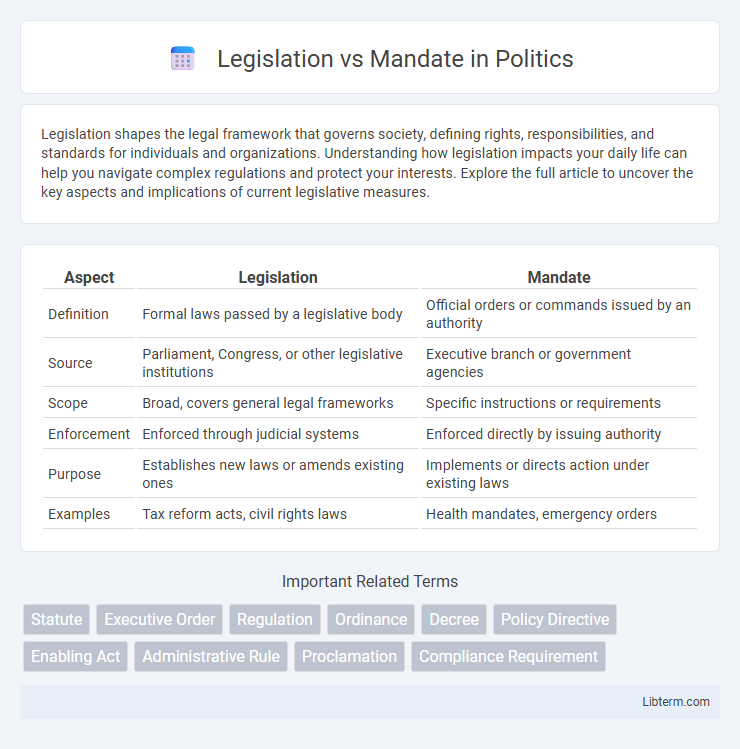Legislation shapes the legal framework that governs society, defining rights, responsibilities, and standards for individuals and organizations. Understanding how legislation impacts your daily life can help you navigate complex regulations and protect your interests. Explore the full article to uncover the key aspects and implications of current legislative measures.
Table of Comparison
| Aspect | Legislation | Mandate |
|---|---|---|
| Definition | Formal laws passed by a legislative body | Official orders or commands issued by an authority |
| Source | Parliament, Congress, or other legislative institutions | Executive branch or government agencies |
| Scope | Broad, covers general legal frameworks | Specific instructions or requirements |
| Enforcement | Enforced through judicial systems | Enforced directly by issuing authority |
| Purpose | Establishes new laws or amends existing ones | Implements or directs action under existing laws |
| Examples | Tax reform acts, civil rights laws | Health mandates, emergency orders |
Understanding Legislation and Mandate: Definitions
Legislation refers to laws enacted by a governing body, establishing legal requirements and frameworks that regulate behavior within a jurisdiction. A mandate is a specific order or directive issued by an authority, compelling compliance with certain actions or policies without the need for legislative passage. Understanding the distinction between legislation as formal lawmaking and mandates as authoritative instructions is crucial for interpreting legal and regulatory environments.
Key Differences Between Legislation and Mandate
Legislation refers to laws enacted by a governing body, consisting of formal rules and regulations that have legal authority and require compliance from the public. A mandate is an authoritative command or instruction, typically issued by an organization or government agency, that directs specific actions or policies but may not carry the full legal weight of legislation. While legislation establishes broad legal frameworks and penalties for non-compliance, mandates often serve as targeted directives aimed at enforcing particular standards or procedures within that framework.
Legal Authority: Legislation vs Mandate
Legislation is enacted by a legislative body, granting legal authority through formal statutes or laws that establish broad regulatory frameworks. Mandates derive their authority from existing legislation or executive orders, imposing specific obligations or requirements enforceable by law. Legal authority of legislation is foundational and comprehensive, whereas mandates function as targeted directives within that established legal structure.
Scope and Applicability: Comparing Impact
Legislation generally establishes broad legal frameworks affecting entire jurisdictions, with wide-ranging applicability across sectors and populations. Mandates, often issued by government agencies or organizations, target specific industries or groups, enforcing compliance within a narrower scope. The impact of legislation is foundational and enduring, shaping systemic policies, while mandates drive immediate, focused changes in operational practices.
Enforcement Mechanisms: Who Ensures Compliance?
Legislation is enforced by government agencies and regulatory bodies empowered to impose penalties, conduct inspections, and initiate legal actions against non-compliance, ensuring adherence through formal legal authority. Mandates are typically enforced within specific organizations or sectors by designated officials or supervisory personnel who monitor compliance and implement corrective measures, often without the need for external legal intervention. The effectiveness of enforcement mechanisms depends on the clarity of rules, the authority of enforcers, and the available resources for monitoring and sanctioning violations.
Origin and Creation Process
Legislation originates through a formal law-making process involving legislative bodies such as parliaments or congresses, where proposals undergo debates, amendments, and voting before becoming law. Mandates are directives issued by authoritative entities, often governmental agencies or executives, to enforce compliance with existing laws or policies without requiring legislative approval. The creation process of legislation is typically lengthy and collaborative, whereas mandates can be established quickly to address immediate regulatory or policy needs.
Examples of Legislation in Practice
Legislation refers to laws enacted by a governing body, such as the Civil Rights Act of 1964, which prohibits discrimination based on race, color, religion, sex, or national origin. Another example is the Clean Air Act, aimed at controlling air pollution to protect public health and the environment. These laws set binding legal standards, while mandates are specific requirements imposed either by legislation or regulatory agencies to enforce compliance.
Mandate in Action: Real-World Instances
Mandates enforce specific actions or policies, evident in vaccination requirements during public health crises, where governments set compulsory rules for disease prevention to ensure community safety. Workplace safety regulations mandate employers to adhere to standards protecting employee health, demonstrating mandates' role in enhancing occupational welfare. Environmental mandates, such as emission reduction targets, compel industries to limit pollution, highlighting mandates' effectiveness in driving sustainable practices.
Advantages and Limitations of Legislation
Legislation provides a formal and legally binding framework that ensures consistent enforcement of rules and protects rights across jurisdictions, offering clear standards and accountability. However, its rigidity can limit flexibility, slow adaptation to changing circumstances, and sometimes result in costly compliance or ineffective implementation. The comprehensive nature of legislation supports long-term stability but may also lead to bureaucratic complexities and resistance from stakeholders.
When is a Mandate More Effective Than Legislation?
A mandate is more effective than legislation when immediate compliance is critical, such as during public health crises where rapid action is necessary to protect safety. Mandates allow for quicker implementation and enforcement, bypassing lengthy legislative processes and reducing bureaucratic delays. In contrast, legislation is better suited for comprehensive, long-term policy changes requiring broad stakeholder input and legal scrutiny.
Legislation Infographic

 libterm.com
libterm.com